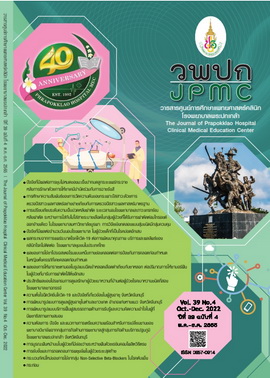COVID-19 Vaccination Intention and Related Factors among Older Adults in Chanthaburi Province
Main Article Content
Abstract
BACKGROUND: Understanding the factors driving the COVID-19 vaccination intention among older adults may develop interventions designed specifically to increase the vaccine uptake.
OBJECTIVES: This study aimed to explore the intention to receive a COVID-19 vaccine among the older population in Chanthaburi Province and its associated factors.
METHODS: This was a cross-sectional survey. The sample consisted of 272 older adults who participated in the study. The Theory of Planned Behavior was used to guide the selected factors. The collection of the data was conducted from October 15 to November 4, 2021. Descriptive statistics, odds ratios, and multiple logistic regression were used to analyze the data.
RESULTS: Forty-three point nine percent of respondents had a medium level of the COVID-19 vaccination intention (2.8±0.7). The factors found to be significant for higher intention were: sufficient income (OR=1.87; 95%CI; 1.03-3.40), having a positive attitude toward a COVID-19 vaccination (OR=3.31; 95%CI; 1.88-5.81), giving importance to the opinion of the family (OR=8.40; 95%CI; 4.58-15.39), following the advice of the healthcare provider (OR=6.18; 95%CI; 3.43-11.13), and perceived behavioral control of receiving the vaccine (OR=3.41; 95%CI; 1.63-7.12).
CONCLUSIONS: The important considerations in designing a COVID-19 vaccination campaign among older adults were to build positive attitudes, communicate accurate information through the family, relatives, and healthcare professionals for decision-making, and enhance the perceived behavioral control in the vaccination, especially among low-income older adults.
Article Details

This work is licensed under a Creative Commons Attribution-NonCommercial-NoDerivatives 4.0 International License.
References
Bloomberg the Company. Vaccine Tracker [Internet].2022 [cited 2022 Apr 14]. Available from https://www. bloomberg.com/graphics/covid-vaccine-tracker-global-distribution/
Vaccination rate “Booster dose in elderly” is still low,31 times decrease the death rate. Bangkokbiznews [Internet]. 2022 Apr 6 [cited 2022 Apr 07].Available from: https://www.bangkokbiznews.com/social/997628
Vaccine hesitancy grows ahead of mass inoculation rollout. BangkokPost [Internet]. 2021 May 25 [cited 2021 May 30]. Available from: https://www.bangkokpost.com/thailand/general/2121399/vaccine-hesitancy-grows-ahead-of-mass-inoculation-rollout
The survey results of needs and concerns for the coronavirus vaccine [Internet]. 2021 [cited 2021 May 30].Available from: https://www.hfocus.org/content/2021/05/21616
Paul E, Steptoe A, Fancourt D. Attitudes towards vaccines and intention to vaccinate against COVID-19: implications for public health communications. Lancet Reg Health Eur [Internet].2021[cited 2022 July 30];1:100012. Available from: https://doi.org/10.1016/j.lanepe.2020.100012
Cordina M, Lauri MA, Lauri J. Attitudes towards COVID-19 vaccination, vaccine hesitancy and intention to take the vaccine.Pharm Pract(Granada) [Internet]. 2021[cited 2022 July 30];19(1):2317. Available from: https://doi.org/10.18549/pharmpract.2021.1.2317
Wong LP, Alias H, Tan YR, Tan KM. Older people and responses to COVID-19: cross-sectional study of prevention practices and vaccination intention. Int J Older People Nurs [Internet].2022[cited 2022 June 22];17(3):e12436. Available from: https://doi.org/10.1111/opn.12436
Wang J, Yuan B, Lu X, Liu X, Li L, Geng S, et al. Willingness to accept COVID-19 vaccine among the elderly and the chronic disease population in China. Hum VaccinImmunother 2021;17:4873-88.
Callow MA, Callow DD. Older adults’ behavior intentions once a COVID-19vaccine becomes available.J ApplGerontol2021;40:943-52.
Older Statistics [Internet].Bangkok: Department of Older Persons;[updated2021 May 28; cited 2021 May 30].Available from: https://www.dop.go.th/th/know/1
Ajzen I, Behavior interventions based on the theory of planned behavior [Internet]. 2006 [cited 2021 May 30] Available from: https://www.researchgate.net/publication/245582784_Behavioral_Interventions_Based_on_the_Theory_of_Planned_Behavior
Thato R. Nursing research: concepts to application. 4thed. Bangkok: Chulalongkorn University Printing House; 2018.
Thanapluetiwong S, Chansirikarnjana S, Sriwannopas O, Assavapokee T, Ittasakul P. Factors associated with COVID-19vaccine hesiteracy in Thai senoirs. Patient Prefer Adherence2021;15:2389-403.
Malesza M, Bozym M. Factors influencing COVID-19 vaccination uptake in anelderly sample in Poland [Internet]. 2021[updated 2021 Mar 23; cited 2022 Apr 8].Available from: https://www.medrxiv.org/content/10.1101/2021.03.21.21254047v1.full.pdf
Gallant AJ, Nicholls LAB, Rasmussen S, Cogan N, Young D, Williams L. Changes in attitudes to vaccination as a result of the COVID-19 pandemic: a longitudinal study of older adults in the UK. PLoS One [Internet]. 2021[cited 2022 Feb 14];16(12):e0261844. Available from: https://doi.org/10.1371/journal.pone.0261844

